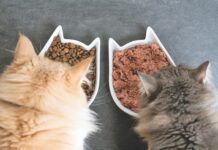Everyone understands the importance of good nutrition as the foundation for good health. We carefully balance our own plates from the food guide pyramid, occasionally supplementing when were just too busy for broccoli. And we also try to feed our feline friends a well-balanced diet because we know that their health is dependent on the appropriate nutrients. But even the best-fed cats can develop health conditions that require dietary changes.
Disease Management
There are a number of chronic diseases that can be managed to some degree by dietary therapy – even when the origin of the disease itself has nothing to do with nutrition.
Most owners are aware of the importance of diet when treating conditions like obesity or diabetes. But nutrition impacts a variety of other conditions too, such as kidney disease, bladder stones and feline lower urinary tract disease, food allergies, heart disease, and gastrointestinal problems.
The therapeutic diets – also known as veterinary or prescription diets – that are available today include formulas for cats recovering from trauma or severe illness, weight-loss formulations, diets for the nutritional management of kidney or gastrointestinal disease and products for the diagnosis and management of food-induced allergies.
A Shopping Challenge
Purchasing well-balanced cat food for a healthy cat is an important task; but for a cat with chronic illness, it becomes more so. Fortunately, pet food companies have made progress in formulating appropriate diets for various conditions.
Kathryn Michel, DVM, MS, board certified in veterinary nutrition and an assistant professor of nutrition at the University of Pennsylvania, recommends a variety of therapeutic diets to her patients. I find most people are very open to dietary therapy, says Dr. Michel. Some clients will go to great lengths to get information about it.
The choice, however, is dependent on your cats veterinarian. When it comes to dietary treatment of chronic conditions, its like prescription medication: You need to follow doctors orders.
Prevention vs. Cure
While life-stage maintenance diets seek to keep kittens and cats in good health and prevent illness, therapeutic diets work to treat an existing health condition. By altering the nutrient profile, such diets can aid in recovery or slow down the progression of disease. This makes the diet inappropriate – and sometimes even harmful -for healthy cats. Thats why they must be used under veterinary supervision and purchased with a prescription from a veterinary clinic.
Some feline health problems can be managed simply by switching your cat to a special diet. Other health problems can be better managed by a treatment regimen supplemented with a special diet. Dr. Michel says some of these diets – like those for obesity, recovery from illness or acute gastrointestinal conditions – are only intended as a temporary change in food. Others, such as those for urinary tract disease or chronic renal failure, are recommended for the duration of the cats life.
Sometimes, patients with dietary hypersensitivity will require long-term therapy with a veterinary product, says Dr. Michel.
Eating Well for Life
Be sure you know how strict your cats dietary restrictions are before you open the treat bag. In some cases – such as with food allergies – Dr. Michel says its important to eliminate all other foods for a period of time. However, in other cases your veterinarian may be able to provide a list of approved snack foods. Generally, you can find appropriate foods to use as treats for pets with almost any condition, says Dr. Michel.
Table for One, Please
In a multiple cat household, feeding one cat a therapeutic diet can certainly be tricky. For example, diets for kidney disease tend to be less palatable than regular maintenance diets, making it important to feed the kidney patient separately to make sure he gets what he needs (and doesnt sneak food from the other cats bowl).
Other diets – such as those for recovery or weight gain – are highly palatable and calorie-dense and might be very tempting to the cats that dont need it. You have to feed the pets separately unless the therapeutic diet in question can be fed to all the pets safely, says Dr. Michel.



